英语同步练习题考试题试卷教案九年级英语上册Unit 14教案
- 格式:doc
- 大小:490.00 KB
- 文档页数:22
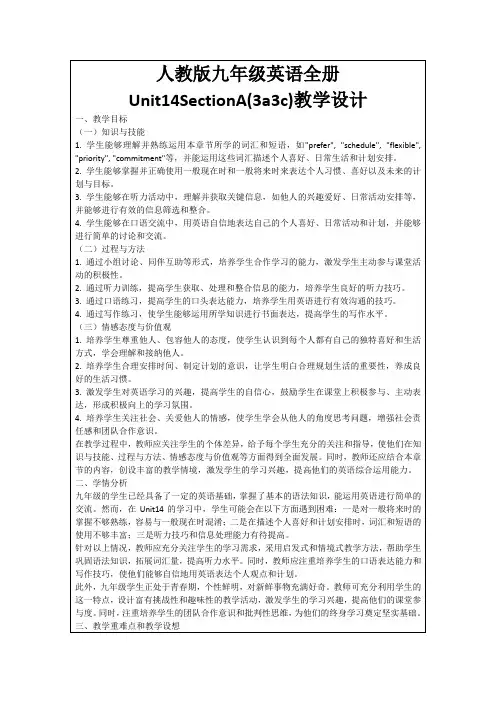
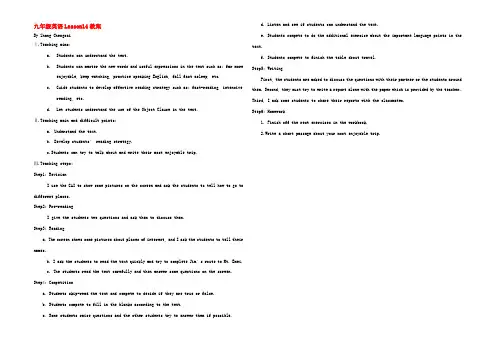
九年级英语Lesson14教案By Zhang Chengcai Ⅰ.Teaching aims:a. Students can understand the text.b. Students can master the new words and useful expressions in the text such as: far moreenjoyable, keep watching, practice speaking English, fall fast asleep, etc.c. Guide students to develop effective reading strategy such as: fast-reading, intensivereading, etc.d. Let students understand the use of the Object Clause in the text. Ⅱ.Teaching main and difficult points:a. Understand the text.b. Develop students ’ reading strategy.c.Students can try to talk about and write their most enjoyable trip. Ⅲ.Teaching steps: Step1: RevisionI use the CAI to show some pictures on the screen and ask the students to tell how to go todifferent places. Step2: Pre-readingI give the students two questions and ask them to discuss them.Step3: Readinga. The screen shows some pictures about places of interest, and I ask the students to tell their names.b. I ask the students to read the text quickly and try to complete Jim ’s route to Mt. Emei.c. The students read the text carefully and then answer some questions on the screen. Step4: Competitiona. Students skip-read the text and compete to decide if they are true or false.b. Students compete to fill in the blanks according to the text.c. Some students raise questions and the other students try to answer them if possible.d. Listen and see if students can understand the text.e. Students compete to do the additional exercise about the important language points in the text.f. Students compete to finish the table about travel. Step5: WritingFirst, the students are asked to discuss the questions with their partner or the students around them. Second, they must try to write a report alone with the paper which is provided by the teacher. Third, I ask some students to share their reports with the classmates. Step6: Homework1. Finish off the rest exercises in the workbook.2.Write a short passage about your most enjoyable trip.。
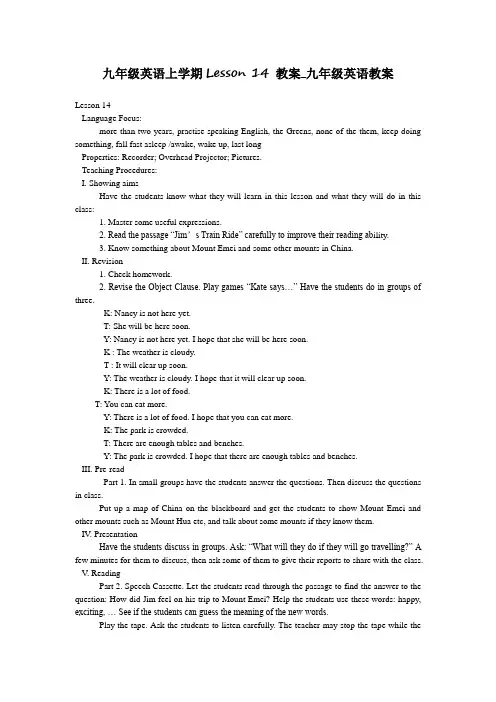
九年级英语上学期Lesson 14 教案_九年级英语教案Lesson 14Language Focus:more than two years, practise speaking English, the Greens, none of the them, keep doing something, fall fast asleep /awake, wake up, last longProperties: Recorder; Overhead Projector; Pictures.Teaching Procedures:I. Showing aimsHave the students know what they will learn in this lesson and what they will do in this class:1. Master some useful expressions.2. Read the passage “Jim’s Train Ride” carefully to improve their reading ab ility.3. Know something about Mount Emei and some other mounts in China.II. Revision1. Check homework.2. Revise the Object Clause. Play games “Kate says…” Have the students do in groups of three.K: Nancy is not here yet.T: She will be here soon.Y: Nancy is not here yet. I hope that she will be here soon.K : The weather is cloudy.T : It will clear up soon.Y: The weather is cloudy. I hope that it will clear up soon.K: There is a lot of food.T: You can eat more.Y: There is a lot of food. I hope that you can eat more.K: The park is crowded.T: There are enough tables and benches.Y: The park is crowded. I hope that there are enough tables and benches.III. Pre-readPart 1. In small groups have the students answer the questions. Then discuss the questions in class.Put up a map of China on the blackboard and get the students to show Mount Emei and other mounts such as Mount Hua etc, and talk about some mounts if they know them.IV. PresentationHave the students discuss in groups. Ask: “What will they do if they will go travelling?” A few minutes for them to discuss, then ask some of them to give their reports to share with the class.V. ReadingPart 2. Speech Cassette. Let the students read through the passage to find the answer to the question: How did Jim feel on his trip to Mount Emei? Help the students use these words: happy, exciting, … See if the students can guess the meaning of the new words.Play the tape. Ask the students to listen carefully. The teacher may stop the tape while thestudents are listening, and ask the students to go on reading. It can test the students’ ability to follow the passage as it is read on the tape.Using Exercise I in the workboo k of Lesson 14, check the students’ reading. The students ask and answer in pairs.VI. ActingDivide the students into small groups. Change this passage into a play, ask them to act out this play. One of them plays the part of a narrator, the others play Mr Green, Mrs Green, Jim, the conductor, and fruit shop assistant.VII. WorkbookDo Exercise 3 in class. Have the students read the sentences and translate them into Chinese, check with the whole class.For Exercise 2, it can be worked as homework.Answers for Exercise 2: by, enjoyable, by, took, bus, lively, comfortable, watching, scenery, offer, magazines, nearby, practised, trip / journey, tired.VIII. SummaryExercises in classRewrite the following sentences1. She will have a trai n ride to Hangzhou. ( She says…)2. Class Five will have a football match with Class Six. ( The teacher says…)3. The station is very crowded. ( He said… )4. A young man is speaking in English. ( Jim said… )5. The train is quite comfortable. (Jim thought…)6. There aren’t too many people in their sleeping car. ( Jim told me…)IX. HomeworkRead the passage after class.Finish off the exercises in the workbook.授课人:郭礼文时间:班级:一、目标再现在本单元中要求学生对在前面五单元中所学过的知识做一次全面的回顾和总结。
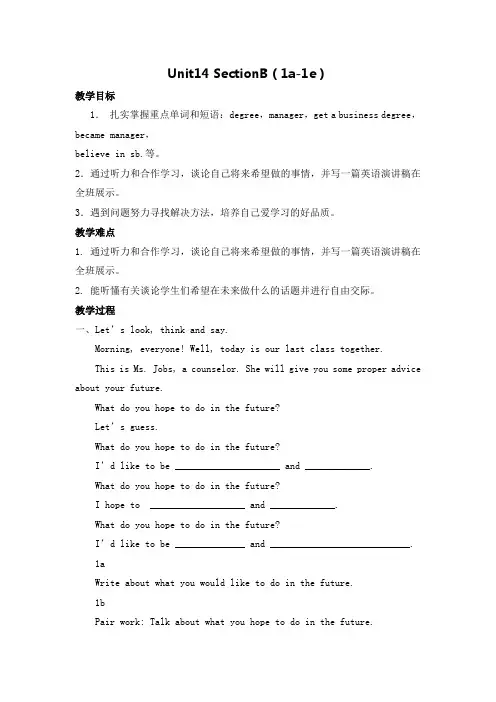
Unit14 SectionB(1a-1e)教学目标1.扎实掌握重点单词和短语:degree,manager,get a business degree,became manager,believe in sb.等。
2.通过听力和合作学习,谈论自己将来希望做的事情,并写一篇英语演讲稿在全班展示。
3.遇到问题努力寻找解决方法,培养自己爱学习的好品质。
教学难点1. 通过听力和合作学习,谈论自己将来希望做的事情,并写一篇英语演讲稿在全班展示。
2. 能听懂有关谈论学生们希望在未来做什么的话题并进行自由交际。
教学过程一、Let’s look, think and say.Morning, everyone! Well, today is our last class together.This is Ms. Jobs, a counselor. She will give you some proper advice about your future.What do you hope to do in the future?Let’s guess.What do you hope to do in the future?I’d like to be _____________________ and _____________.What do you hope to do in the future?I hope to ___________________ and _____________.What do you hope to do in the future?I’d like to be ______________ and ____________________________.1aWrite about what you would like to do in the future.1bPair work: Talk about what you hope to do in the future.A: What do you hope to do in the future?B: …A: What things have you done for your dream?B: …A: What are you doing/will you do for your dream?B: …A: How are you going to achieve it?B: ...1cListen to a class discussion. Check (✔) the hopes you hear.What is the topic of the discussion?What is the topic of the discussion?What’s his/her name? Listen.What do they hope to do in the future?1dListen again. Complete the passage.Today is the students’ last class. Bob feels ____ about it and thinks Mrs. Chen’s classes have been _____. The students talk about what they want to do in the future. Bob hopes to _____ the exam to get into senior high school. Shirley wants to get into a ______ school. Ken is good at _______ and he won a _____ for it. So he wants to be a(n) _________.Mrs. Chen believes in all of them and tells them to “ _________”. To celebrate the end of junior high, they are having a ______. They ask Mrs. Chen to come, and she is happy to accept the invitation.Let’s create.How do you feel when you hear it is your last class?Who has helped you most?I think Mrs. Chen. We all think her classes _______________What will you do after you graduate?I hope to ___________________________What advice has your teacher given you?Mrs. Chen ______________________ andWhat are you looking forward to?I’m looking forward to _____________________Bob has a speech for his graduation.Hello, everyone! I’m Bob. I’m so sad that here we are at the end of junior school. We have studied and lived together for three years in our school. I really learned a lot from you all, my dear teachers and friends. I have improved my English a lot with the help of my teacher Mrs. Chen. Mrs. Chen’s classes have been great. She told us to go for our dreams.I hope to pass the exam to get into senior high school. And I’m looking forward to the life of it. That’s all. Thank you for your listening.What are your thoughts for your graduation. Let’s have a speech contest and talk about your graduation.The questions can help you.1. How have you changed since you started junior high school?2. Who has helped you most?3. What advice have your parents given you?4. What will you do after you graduate?5. What are you looking forward to?巩固练习同学们做Exercisesthank you。
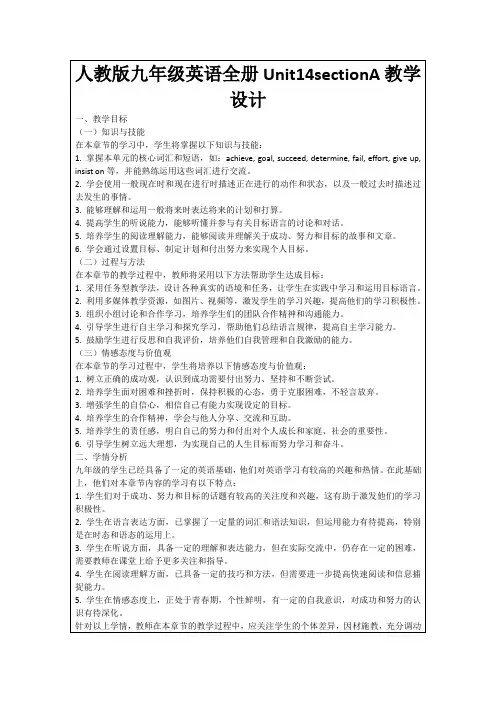
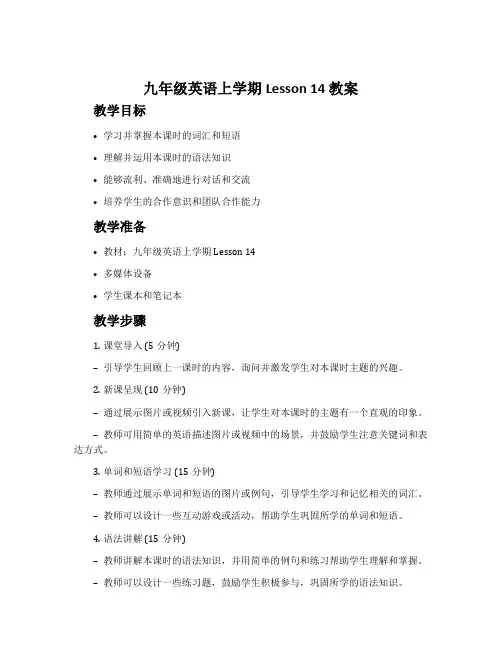
九年级英语上学期Lesson 14 教案教学目标•学习并掌握本课时的词汇和短语•理解并运用本课时的语法知识•能够流利、准确地进行对话和交流•培养学生的合作意识和团队合作能力教学准备•教材:九年级英语上学期Lesson 14•多媒体设备•学生课本和笔记本教学步骤1.课堂导入 (5分钟)–引导学生回顾上一课时的内容,询问并激发学生对本课时主题的兴趣。
2.新课呈现 (10分钟)–通过展示图片或视频引入新课,让学生对本课时的主题有一个直观的印象。
–教师可用简单的英语描述图片或视频中的场景,并鼓励学生注意关键词和表达方式。
3.单词和短语学习 (15分钟)–教师通过展示单词和短语的图片或例句,引导学生学习和记忆相关的词汇。
–教师可以设计一些互动游戏或活动,帮助学生巩固所学的单词和短语。
4.语法讲解 (15分钟)–教师讲解本课时的语法知识,并用简单的例句和练习帮助学生理解和掌握。
–教师可以设计一些练习题,鼓励学生积极参与,巩固所学的语法知识。
5.对话表演 (20分钟)–将学生分为小组,每组两人,让他们根据教师提供的对话情境进行表演。
–教师可以提供一些问题,引导学生展开对话,并注意语法和单词的正确使用。
–鼓励学生创造性地运用所学的语言知识,增强他们的口语表达能力。
6.全班练习 (15分钟)–教师设计一些全班合作练习,让学生共同完成,巩固所学的知识和技能。
–可以是填空题、选择题或是完成句子等形式,让学生充分参与,培养他们的团队合作精神。
7.课堂总结 (5分钟)–教师对本课时的内容进行总结,并告诉学生下一课时的学习目标和安排。
教学拓展•学生可以利用课后时间复习和巩固本课时的内容,通过阅读英语文章、听英语音频、观看英语视频等方式进行英语学习。
课后作业•完成课本上的练习题•听写本课时的单词和短语•准备下一节课的预习材料以上是九年级英语上学期Lesson 14的教案,通过本课的教学,希望学生能够更好地掌握和运用所学的语言知识,提高他们的英语能力和综合素质。

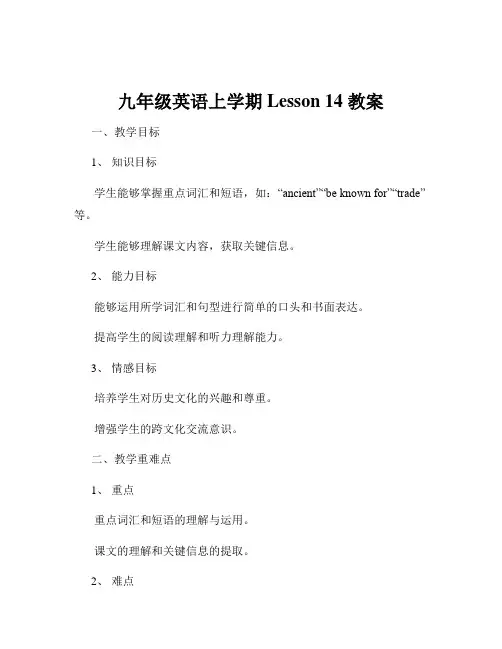
九年级英语上学期Lesson 14 教案一、教学目标1、知识目标学生能够掌握重点词汇和短语,如:“ancient”“be known for”“trade”等。
学生能够理解课文内容,获取关键信息。
2、能力目标能够运用所学词汇和句型进行简单的口头和书面表达。
提高学生的阅读理解和听力理解能力。
3、情感目标培养学生对历史文化的兴趣和尊重。
增强学生的跨文化交流意识。
二、教学重难点1、重点重点词汇和短语的理解与运用。
课文的理解和关键信息的提取。
2、难点某些复杂句型的结构和用法。
对历史文化相关内容的深入理解和讨论。
三、教学方法1、讲授法讲解重点词汇、短语和句型。
2、任务驱动法布置阅读、听力等任务,让学生在完成任务的过程中提高语言能力。
3、讨论法组织学生讨论与课文相关的话题,培养思维和表达能力。
四、教学过程1、导入(5 分钟)展示一些关于古代文明的图片或视频,引起学生的兴趣。
提问学生对古代文明的了解,引导学生思考古代文明的特点和重要性。
2、词汇学习(10 分钟)讲解课文中的重点词汇,如“ancient”(古代的)、“be known for”(因而闻名)、“trade”(贸易)等。
通过例句和情景帮助学生理解词汇的用法。
3、听力训练(10 分钟)播放课文录音,让学生边听边理解。
听完后,设置一些简单的听力理解问题,如:“What is the passage mainly about?” 等,检查学生的听力理解情况。
4、阅读分析(15 分钟)学生自主阅读课文,找出关键信息。
引导学生分析课文的结构和段落大意。
5、语言点讲解(10 分钟)讲解课文中的重点句型和语法,如:“It is + adj +for sb to do sth”等。
让学生进行模仿造句,巩固所学知识。
6、小组讨论(10 分钟)组织学生分组讨论以下问题:“What can we learn from ancient civilizations?” “How can we protect and inherit ancient cultures?”每组选派代表进行发言,分享小组讨论结果。
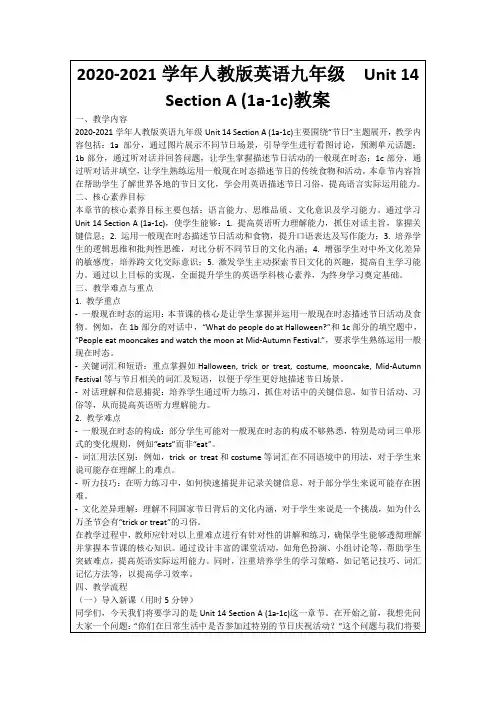
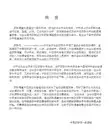
Unit 14 Have you packed yet?The First PeriodⅠ.Teaching Aims and Demands1.Knowledge Objects(1)Key Vocabularybathing suit, water, travel, guidebook, beach towel, street map(2)Target LanguageHave you watered the plants yet?Yes, I have already watered them.2.Ability Objects(1)Train students’ listening ability.(2)Train students’ communicative competence.3.Moral ObjectsHave everything in readiness before you do it.In this way, you can finish it perfectly or have a good time.Ⅱ.Teaching Key PointTarget LanguageⅢ.Teaching Difficult Points1.How to train students’ listening ability.2.How to train students’ communicative competence.Ⅳ.Teaching Methods1.Listening-and-answering activity to help the students go through with the listening material.2.Pairwork to make every student work in class.Ⅴ.Teaching Aids1.A tape recorder2.The blackboardⅥ.Teaching ProceduresStep ⅠRevisionT: Last week we finished Unit 13.In this unit, we learned how to talk about how things affect us.For example, Loud music makes me tense.That movie made her sad.Now I ask some students to make sentences with the structure…make me…S1: Parties make me excited.S2: School vacations make me happy.S3: That movie made me want to leave.S4: The story made me cry.S5: The awful picture makes me nervous.T: Very good.From today on, we will learn Unit 14.Now.I ask a student to come to the blackboard and write the numbers 1 to 20 on the blackboard.(After the student has written the numbers 1 through 5, start talking to the rest of the class)T: Has he written the number 1 yet?Class repeat the question.Has he written the number 1 yet?S s: Has he written the number 1 yet?T: (Pointing to the number 1 on the board)Yes, he has already written the number 1.Class repeat.Yes, he has already written the number 1.S s: Yes, he has already written the number 1.T: (Writing the word already on the blackboard)This is the word already.Class repeat.Already.Look at the blackboard.(pointing to the blackboard)Has he written the number 50 yet? Class repeat the question.Has he written the number 50 yet?S s: Has he written the number 50 yet?T: (Pointing to the highest number already on the blackboard)No, he hasn’t written the number 50 yet.Class repeat.No, he hasn’t written the number 50 yet.S s: No, he hasn’t written the number 50 yet.T: (Writing the word yet on the blackboard)Tish is the word yet.Class repeat.Yet.Now, look at the two words already and yet.Which one is used to talk about things that have happened in the past?SSs: Already.T: Yeah.V ery good.So the other word yet is used to talk about things that will happen in the future.Yeah?SS: Yes.Step Ⅱ1aThis activity introduces key vocabulary and helps students review vocabulary they already know.Read the instructions aloud to the class.Say, Who can give an example of a beach vacation and sightseeing in a city? Ask a student to give the example.(bathing suit, travel guidebook)Get students to add some things to the lists under the two headings.A beach vacation and Sightseeing in a city.Have students do the work individually first.While they are working, walk around the classroom checking the progress of the students.Let students tell the class the words they wrote.Write the words on the blackboard.Read them and let students repeat.Then ask other students to add other words to the lists.Sample answersStep Ⅲ1bThis activity gives students practice in understanding the target language in spoken conversation.Look at the picture.Ask, What can you see in the picture? (There is a family in the picture.They are getting ready for a beach vacation)Point to the box.Invite a pair of students to read the conversation to the class.A: Have you packed the beach towels yet?B: No, I haven’t.Look at the six chores on the list.Let students read each item, then ask different students to explain the meaning of each item in their own words.Make sure students understand the meaning of each item.Go through the instructions withthe class.Point to the blank lines in front of each item in the list.Say, You will hear a family talking as they get ready to go on vacation.Listen carefully.Make sure what the family talks about and put a checkmark in front of each chore that is already done.Play the tape.The first time students only listen.Play the tape a second time.Now listen to the tape again.This time please put your checkmarks on the correct blanks.Check the answers with the whole class.AnswersTapescriptWoman: Have you packed the beach towels yet?Boy: No, I haven’t.Can’t Judy pack them?Woman: No, she’s busy.Could you please water the plants?Boy:I’ve already watered them.Woman: Oh, thanks.Man: What about the travel guidebook and the street map?Woman: I’ve already bought the travel guidebook, but I haven’t got the street map yet.Man: That’s OK.I’ll get it.Have you packed the camera?Boy: Yes.I’ve already put it in my suitcase.Woman: Well, I guess that’s everything.Boy: Almost everything.We haven’t locked the windows yet.Step Ⅳ1cThis activity provides guided oral practice using the target language.Go through the instructions with the whole class.Look at the example in the box.Invite a pair of students to read it to the class.S A: Have you watered the plants yet?S B: Yes, I have already watered them.Tell students they will be making conversations with a partner.Look back at the chores in Activity lb.Say, Now look back at the chores in Activity lb.Make conversations talking about what the family members have already done and what they haven’t done yet, using words from the chores, such as packed the camera, locked the windows, bought a street map.While students are working in pairs, walk around the classroom and listen to some pairs.If necessary, offer language support.Then get several pairs of students to say their conversations to the class.Conversation 1S A: Have they packed the camera yet?S B: Yes, they have already packed the camera.Conversation 2S A: Have they bought a street map yet?S B: No, they haven’t bought a street map yet.Notes1.pack—(here)get ready for a journey by doing this2.guidebook—book for travellers, tourists, etc, with information about a place3.Have you watered the plants yet?Yes, I have already watered them: PresentPerfect Tense.The structure is have+ p.p.Pay attention to the two words already and yet.Already is used in affirmative sentences; while yet is used in negative and interrogative sentences.Step ⅤSummaryIn this class, we’ve learned some important words, such as water, travel, guidebook, beach towel.We’ve also learned the target language.Have you watered the plants yet? Yes, I have already watered them.Step ⅥHomeworkMake conversations in pairs to review the target language.Step ⅦBlackboard DesignUnit 14 Have you packed yet?The Second PeriodⅠ.Teaching Aims and Demands1.Knowledge Objects(1)Key Vocabularyrefrigerator, garage, suitcase, clean out, put in, turn off(2)Target LanguageHave you watered the plants yet?No, I haven’t.Have you packed the camera yet?Yes.I’ve already put it in my suitcase.Have you fed the cat?No.I haven’t fed her yet.2.Ability Object(1)Train students’ listening ability.(2)Train students’ speaking ability.3.Moral ObjectWe must be ready with our work before we do it.Ⅱ.Teaching Key Points1.Key Vocabularyclean out, put in, turn off2.Target LanguageHave you watered the plants yet?No, I haven’t.Have you packed the camera yet?Yes.I’ve already put it in my suitcase.Have you fed the cat?No.I haven’t fed her yet.3.StructuresHave you packed the camera yet?Yes.I’ve already put it in my suitcase.Have you fed the cat?No.I haven’t fed her yet.Ⅲ.Teaching Difficult Points1.the target language2.How to train students’ listening ability.Ⅳ.Teaching Methods1.Listening method to improve the students’ listening ability.2.Pairwork to make every student work in class.Ⅴ.Teaching Aids1.A tape recorder2.The blackboardⅥ.Teaching ProceduresStep I RevisionCheck homework.Get some pairs to read their conversations.Collect their conversations and help students correct any mistakes.Step Ⅱ2aThis activity provides guided listening practice using the target language.Look at the picture.Ask, What can you see in the picture? (A boy and a girl are in the kitchen.They both look a little stressed out)Go through the instructions with the class.You will hear a boy and a girl talking about getting ready to go on vacation.Write M after each thing that Mark says and T after each thing that Tina says.Look at the sample answer.Say, Tina said, No.I haven’t cleaned out the refrigerator yet.Get students to repeat No.I haven’t cleaned out the refrigerator yet.Play the recording for students the first time.This time students only listen to the recording.Play the recording a second time.This time let students write Min front of Mark’s statements, and T in front of Tina’s statements.Check the answers with the class.Answers1.T 2.T 3.M 4.T 5.M 6.TTapescriptBoy: Mom and Dad said they want to leave in ten minutes.Are you ready, Tina?Girl: No.I haven’t cleaned out the refrigerator yet.I have to do that right now.Boy: Tina! You’re unbelievable.What about your bike?Girl: I’ve already put it in the garage.But I haven’t locked the garage yet.That’s your job, Mark.Boy: I know.I’ve already done most of my jobs.I’ve taken out the trash.Girl: Have you fed the cat yet?Boy: Not yet.I’ll do it in a minute.Have you turned off your radio?Girl: Yes, I have.I think we’re almost ready.Step Ⅲ2bThis activity provides guided listening practice using the target language.Go through the instructions with the class.Look at the list of questions with blanks in front of each one.Then look back at the statements in Activity 2a.Say, Some of the statements in Activity 2a are answers to questions in Activity 2b.Write the number of the correct answer from Activity 2a in front of each question in Activity 2b.Get several students to read the questions in Activity 2b to the class.Look at the sample answer.Ask a student to read the question and answer to the class.Are you ready, Tina?No, I haven’t cleaned out the refrigerator yet.Play the recording for students.Let students write their answers in the blanks.Play the recording again if necessary.Correct the answers.AnswersHave you fed the cat yet? 5What about you bike? 2Are you ready, Tina? 1Have you turned off your radio? 6Step Ⅳ2cThis activity provides guided oral practice using the target language.Look at the sample conversation in the speech bubbles.Invite a pair of students to read it to the class.S A: Are you ready, Tina?S B: No.I haven’t cleaned out the refrigerator yet.Go through the instructions with the class.Say, With your partner make a conversation using information from Activities 2a and 2b.Have students work in pairs.While they are working, walk around the classroom checking the progress of the pairs and offering help as needed.Invite two pairs to say their conversations to the class.Conversation 1S A: Have you fed the cat yet?S B: Not yet.I’ll do it in a minute.Conversation 2S A: Have you turned off your radio?S B: Yes, I have.Step ⅤGrammar FocusLook at the grammar focus box.Get three students to read the questions and answers to the class.Have you watered the plants yet?No, I haven’t.Have you packed the camera yet?Yes.I’ve already put it in my suitcase.Have you fed the cat?No.I haven’t fed her yet.Let students make up other sentences in pairs using have you…yet questions.For example: Have you had lunch yet? Have another student answer truthfully: Yes, I have or Yes, I have already had lunch, or No, I haven’t had lunch yet.Pay attention to the use of already and yet.Say, When we use the words have and already, we are talking about something that happened in the past, but not a long time ago.When we use the words haven’t and yet, we are talking about something that will happen in the future, but not a long time from now.It will happen soon.For example: I’ve already had breakfast, but I haven’t had lunch yet.Draw a simple diagram to help students understand the grammar focus.Get some pairs to say their sentences aloud to the class.A sample sentenceI’ve already had lunch, but I haven’t had supper yet.Culture noteMany Americans are used to taking at least one vacation trip a year.But in China, some of the students may not be in the habit of taking an annual vacation, or even making a trip to another city.For some students, financial limitations and family obligations make such travel impossible.For others, it may be that taking trips is not something that is common in their home culture.Step ⅥSummaryIn this class, we’ve learned key vocabulary clean out, put in, turn off and the targetlanguage Have you watered the plants yet? No, I haven’t.Have you packed the camera yet? Yes, I’ve already put it in my suitcase.Have you fed the cat? No.I haven’t fed her yet.Step ⅦHomeworkGet students to write some sentences according to the target language.Step ⅧBlackboard DesignUnit 14 Have you packed yet?The Third PeriodⅠ.Teaching Aims and Demands1.Knowledge Objects(1)Key Vocabularychop, wood, light, village, well, farm(2)Target LanguageHave you bought a newspaper?Yes, I’ve already bought a newspaper.2.Ability Objects(1)Train students’ integrating skills.(2)Train the ability of expressing students’ own opinions.3.Moral ObjectsWe should make a plan for our everyday activities and make a schedule.It can remind us how to spend the time.It is good for our study and life.Ⅱ.Teaching Key PointTrain students’ integrating skills.Ⅲ.Teaching Difficult PointHow to improve students’ integrating skills.Ⅳ.Teaching Methods1.Fast-reading method2.Groupwork and pairworkⅤ.Teaching Aids1.A projector2.The blackboardⅥ.Teaching ProceduresStep I RevisionT: Yesterday we learned the target language.The structure is Have you…yet? Yes.I’ve already…Have you…? No.I haven’t…yet.Now who can make sentences using the structure?S1: Have you turned off your radio yet?S2: Yes.I’ve already turned it off.S1: Have you finished your homework?S2: No.I haven’t finished it yet.T: Very good.Step Ⅱ3aThis activity provides reading practice using the target language.Show the key vocabulary words on the screen by a projector.Read the words and ask students to repeat again and again until they can pronounce the words fluently and accurately.Before reading the e-mail message, ask the students what chores do you usually do? Please tell me.(do my homework, clean my room, water the plants, clean our classroom etc.)Go through the instructions with the class.Look at the e-mail message.Let a student read the e-mail aloud to the class.Correct any pronunciation errors to make sure the student is providing a good model for the rest of the class.Get students to read the e-mail message individually, and underline the different chores on their own,Check the answers with the class.Answers1.do my homework2.take the dog for a walk3.water my mom’s plants4.do some shopping5.chop wood6.light the fire7.collect water8.feed the animalsLet students read the e-mail again for further comprehension.While they are reading.Walk around the classroom, offering help if they have any words or phrases they don’t understand.Notes1.chore—small duty or piece of work, especially ordinary everyday task(in the home, on a farm, etc.)In the e-mail message, there are many chores, such as do my homework, take the dog for a walk, water my mom’s plants.2.chat—talk about unimportant things3.kid—(sl)child; young person4.well—(here n.)shaft, usually lined with brick or stone, for obtaining water from an underground source 5.anyway—in any possible way; by any possible meansStep Ⅲ3bThis activity provides reading, writing.listening and speaking practice using the target language.Look at the pictures of the three people and read their names aloud to the class.Then point to the chart.Let students read the information in it.Make sure students understand the information in the chart by asking questions and point out things.T: Look at the three pictures above the chart.Under each person is a list of the things he or she has done or will do today.Now look at the chart.What do you see in the first column?S1: Numbers.Clock times.T: That’s right.Those are clock times.Those times show what the three people were doing at 9:00,at 10:00,and so forth.It is 12:00 noon now.so the 1:00 and 2:00 times show things they will do later today.What has Steve already done?S2: He’s already done his homework.He’s already bought a newspaper.He’s already fed the dog.T: That’s correct.What things hasn’t he done yet?S3: He hasn’t watered the plants.He hasn’t cleaned his room.T: OK.Very good.Go through the instructions with the class.Put students in several groups.Say, Each student in a group will decide to be one of the people.The other students in the group will ask questions to find out which person in the chart he or she has decided to be.Make sure students understand how to do the exercise.Look at the example in the box.Invite a pair of students to read it aloud to the class.S A: Have you bought a newspaper?S B: Yes, I’ve already bought a newspaper.Ask students, which of the three people could it be? Can you find out? Yeah.It could be Steve or Elise.Get students to do the work in groups.While they are working, move around the classroom checking the work of each group.Ask two groups to do the work as the examples.Group 1: Have you watered the plants?S1: Yes.I’ve already watered the plants.Group 2: Have you fed the dog?S2: No.I haven’t fed the dog yet.(Person 1: Kathy; Person 2: Elise)Step ⅣPart 4This activity provides reading, writing, listening and speaking practice using the target language.Go through the instructions with the class.Invite a good student to give an example of things that he or she has and hasn’t done this week: I have done my homework.But I haven’t done some shopping.Put students in some groups of three.Let students complete the work in groups.Finish the table.Review the task.Get some groups to share the results of their surveys.Sample answersOptional activityAsk students to write their own schedules, listing the time of day they do each thing.Then get students to work in pairs.Student A thinks of one activity.Student B gets five tries to guess the activity.Then student B thinks of an activity and student A guesses what it is.Step ⅤSummaryIn this class, we’ve learned some key vocabulary words such as chop, wood, light.village, well, farm.We’ve also done a lot of reading, writing and speaking practice using the target language.Step ⅥHomework1.Finish off the exercises on pages 57~58 of the workbook.2.Get students to talk about the things they have done and they haven’t done yet this week in pairs.Step ⅦBlackboard DesignUnit 14 Have you packed yet?The Fourth PeriodⅠ.Teaching Aims and Demands1.Knowledge Objects(1)Key Vocabularymember, original, songs, award(2)Target LanguageHave they been on TV yet?Yes, they’ve been on TV lots of times.2.Ability Object(1)Train students’ speaking and listening ability.(2)Train students’ ability to understand the target language in spoken conversation.(3)Train students’ ability to use the target language.3.Moral ObjectLove music and you can benefit from it.Ⅱ.Teaching Key Points1.Key Vocabularymember, original, songs, award2.Target LanguageHave they been on TV yet?Yes, they’ve been on TV lots of times.Ⅲ.Teaching Difficult Points1.How to train students’ speaking and listening ability.2.How to use the target language.Ⅳ.Teaching Methods1.Listening method2.Groupwork to make every student work in class.Ⅴ.Teaching Aids1.A tape recorder2.The blackboardⅥ.Teaching ProceduresStep I RevisionCheck homework.Ask some pairs to say their conversations to talk about the things they have done and they haven’t done yet this week.S A: Have you done your homework?S B: Yes, I’ve already done my homework.S A: Have you cleaned your room?S B: No, I haven’t cleaned my room yet.Step ⅡPart 1This activity introduces key vocabulary, and helps students review vocabulary they already know.Look at the picture.Ask, What can you see in the picture? (A man is playing the guitar and singing a song)Point to the box.Invite a student to read the four questions.Make sure students understand the questions.Get students to fill in the blanks on their own.A moment later, ask several students to read their answers to the class.Notes1.favorite—(adj.)best liked2.What is your favorite band?—What band do you like best?3.band—group of persons who play music together4.band member—member of a bandStep Ⅲ2aThis activity gives students practice in understanding the target language in spoken conversation.Look at the picture.A record agent is interviewing members of a band.Let students read the instructions.Point to the headings and the blank lines following each heading.You will hear a woman interviewing members of a band.They are talking about the band.Now, listen and write your answers on these blank lines.Play the recording the first time.This time students only listen.Play the recording a second time.This time, askstudents to write their answers on the blank lines as they listen to the recording.Play the tape again if necessary.Check the answers with the class.AnswersBand’s name: Apple Ice CreamHow long they’ve been together: About a yearNumber of concerts they’ve done: SixTapescriptWoman: Hmmm.That was…umm…not bad.Now tell me a little about yourselves.What was your name again? Boy 1: Apple Ice Cream.Woman: Apple Ice Cream? That’s uhhh …a nice name.Hong long have you been together?Boy 1: About a year.Woman: One year, huh? And have you written any original songs yet?Boy 2: Yes, we have.We used to play stuff by other bands, but now we only play our own songs.That one you just heard was ours.Woman: Good, great! I’m interested in people who play their own music.Have you ever won an award of any kind? Boy 1: Yes, we have.We won the best new group of the year last month.Woman: Wow.That’s great.Have you made a music video yet?Boy 1: No, not yet.Woman: But you’ve had your own concert?Boy 2: Oh, yeah.We’ve had six concerts of our own.Woman: Have you ever been on TV?Boy 1: No, we haven’t.But we’ve already talked to "Bands on Parade" about doing a TV show next month.Woman: Sounds like you guys are on your way.Step Ⅳ2bThis activity provides listening practice using the target language.Go through the instructions with the class.Look at the list of things the band may or may not have done.Get different students to read the list.Make sure students understand the task.You will hear the same recording again.This time please listen and check the things the band has already done.Point to the sample answer.On the recording you hear that the band has already written some original songs so you check that answer.If necessary, play the recording again.Then get students to put checkmarks in front of the correct answers.Check the answers.Answers√written original songsmade a music video√won an awardbeen on TV√had concertsNotes1.original—newly formed or created, not copied or imitated2.award—(here)a prize in a competition3.video—televisionStep Ⅴ2cThis activity provides guided oral practice using the target language.Look at the sample conversation in the box.Invite two students to read it to the class.S A: Have they been on TV yet?S B: Yes, they’ve been on TV lots of times.Go through the instructions with the class.Talk about your favorite bands with your partner.Let students work in pairs.As they work, walk around the classroom checking the progress of the pairs and offering help as needed.A moment later, invite two pairs to say their conversations to the class.A1: Have they written any original songs yet?B1: Yes, they’ve written several original songs.A2: Have they had their own concert yet?B2: Yes, they’ve had five concerts of their own.Step ⅥSummaryIn this class, we’ve learned some key vocabulary, such as member, original, songs, award.We’ve also learned the target language.Have they been on TV yet?Yes, they’ve been on TV lots of times by listening and speaking.Step ⅦHomeworkTalk about some bands using the target language, and write down the conversations.Step ⅧBlackboard DesignUnit 14 Have you packed yet?The Fifth PeriodⅠ.Teaching Aims and Demands1.Knowledge Objects(1)Key V ocabularyhit, appear, tour, miss, lead singer, mostly, top ten, good luck, off to a great start(2)Practise reading an article.(3)Practise writing something using the target language.2.Ability Objects(1)Improve students’ integrating skills—reading skill and writing skill.(2)Improve students’ speaking ability by groupwork.3.Moral ObjectIt is good for us to listen to music in the busy life.Music can make us relaxed, and we can work better.Ⅱ.Teaching Key PointPractise reading and writing using the target language.Ⅲ.Teaching Difficult Points1.How to improve students’ reading ability.2.How to improve students’ speaking ability by groupwork.Ⅳ.Teaching Methods1.Reading method to improve students’ reading ability.2.Writing method to improve students’ writing ability.3.Pairwork to make every student work in class.Ⅴ.Teaching Aids1.A projetor2.The blackboardⅥ.Teaching ProceduresStep I RevisionRevise the target language presented in this unit.Check homework.Ask some pairs to read out their conversations.Step Ⅱ3aThis activity provides reading practice using the target language.Teach the new words.Show the new words on the screen by a projector.Read the words and ask students to repeat them again and again until they can pronounce them correctly and fluently.Look at the article Don’t miss the New Ocean Waves! Invite a student to read the article aloud to the class.Correct any pronunciation mistakes to make sure the student is providing a good model for the rest of the class.Look at the picture.Ask students, What’s the article about? Can you guess?(It’s about a band)Go through the instructions with the students.Make sure students know what to do.Read the article carefully.Circle the things the New Ocean Waves have already done.Underline the things they haven’t done yet.Before students do it, give them two examples: One thing the New Ocean Waves have already done is In the last twelvemonths, they’ve had three major concerts.Ask students to circ1e the words had three major concerts.One thing they haven’t done is They’re going to appear on CCTV next month.Let students underline those words appear on CCTV.Get students to finish the work on their own.Check the answers with the class.AnswersCircled: had three major concerts; made a bit CD; played other people’s songs; played mostly our own songs; had a few songs in the top ten.Underlined; appear on CCTV; go on a world tour; hope to have a number one hitNotes1.hit—successful attempt or performance, for example, hit songs, songs that win wide popularity2: lead—principal part in a play; actor or actress who plays such a part.3.some day—on a day in the future; pay attention to the difference between some day and one day; one day means on a day in the past or in the future4.charity—(kindness in giving)help to the poor; money, food, etc.so givenStep Ⅲ3bThis activity provides reading and writing practice using the target language.Read the instructions aloud to the class.Get a students to read the sentences at the beginning of the paragraph to the class.Tell students that they should look back at Activity 2b and finish writing the paragraph using the information in Activity 2b.Have students finish the paragraph on their own.While they are working, walk around the classroom offering help and answering questions as needed.When they finish, invite a student to read his or her completed paragraph to the class.A sample paragraphApple Ice Cream is a rock band.They have been together for about a year.They have written their own original songs although they used to sing other people’s songs.They won "The Best New Group of the year." award last year.They haven’t made a music video yet, but they’ve had six concerts of their own.They haven’t been on TV yet, but they have talked to Bands on Parade about doing a TV show next month.Step Ⅳ3cThis activity provides writing practice using the target language.Read the instructions Write about your favorite band aloud.Then ask several students to say the name of the band they want to write about.(For example, F4, Twins, Beyond and Backstreet Boys.)Make sure students know enough about the band they choose to write at least five sentences.Get students to use the paragraph in Activity 3b as a sample.When they work, walk around the classroom offering more help if needed.When they finish, invite a student to read his/her composition as an example, with different students contributing sentences and correcting each other’s information.A sample compositionBackstreet Boys is a pop band.They have been together for nearly ten years.There are five American singers in the band.They have already written their own original songs.They have already made many music records and have had many concerts of their own.They have won many awards many times.But they haven’t been to China yet.I hope they can come to China to have a concert this year.Step ⅤPart 4。
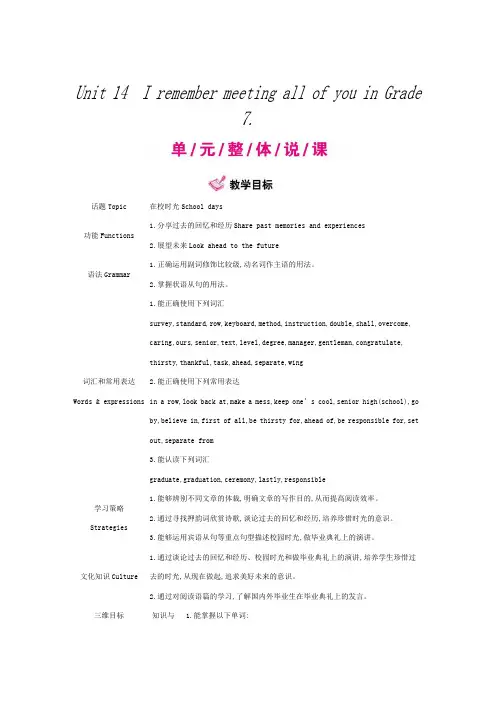
Unit 14 I remember meeting all of you in Grade7.话题Topic 在校时光School days功能Functions1.分享过去的回忆和经历Share past memories and experiences2.展望未来Look ahead to the future语法Grammar1.正确运用副词修饰比较级,动名词作主语的用法。
2.掌握状语从句的用法。
词汇和常用表达 Words & expressions 1.能正确使用下列词汇survey,standard,row,keyboard,method,instruction,double,shall,overcome,caring,ours,senior,text,level,degree,manager,gentleman,congratulate,thirsty,thankful,task,ahead,separate,wing2.能正确使用下列常用表达in a row,look back at,make a mess,keep one’s cool,senior high(school),goby,believe in,first of all,be thirsty for,ahead of,be responsible for,setout,separate from3.能认读下列词汇graduate,graduation,ceremony,lastly,responsible学习策略Strategies1.能够辨别不同文章的体裁,明确文章的写作目的,从而提高阅读效率。
2.通过寻找押韵词欣赏诗歌,谈论过去的回忆和经历,培养珍惜时光的意识。
3.能够运用宾语从句等重点句型描述校园时光,做毕业典礼上的演讲。
文化知识Culture 1.通过谈论过去的回忆和经历、校园时光和做毕业典礼上的演讲,培养学生珍惜过去的时光,从现在做起,追求美好未来的意识。
Section A 单词survey n.调查standard n.标准;水平row n.一排;一列;一行shall modal v.将要;将会overcome v.克服;战胜method n.方法;措施instruction n.指示;命令level n.水平graduate v.毕业;获得学位ours pron.我们的senior adj.级别(或地位)高的text n.文本;课文caring adj.体贴人的;关心他人的keyboard n.键盘式电子乐器;键盘double v.加倍;是……的两倍adj.两倍的;加倍的短语in a row连续几次地do a survey做调查be patient with对……有耐心go by(时间)逝去;过去graduation n.毕业ceremony n.典礼;仪式lastly adv.最后responsible adj.有责任心的短语get into被录取;被接受入学believe in信任;信赖first of all首先be thirsty for渴望;渴求deal with应对;处理be thankful to sb.对某人心存感激set out出发;启程separate from分离;隔开句型1. First of all, I’d li ke to congratulate all the students who are here today. 首先,我想祝贺今天在场的所有学生。
2. You’ve all grown up so much and I’m so proud of you.你们都成长了很多,我为你们感到无比自豪。
3. I don’t need to tell you that life in senior high school will be harder and that you have many difficult tasks ahead of you. 不需要我说你们也知道高中的生活将更加艰苦,在你们面前会有许多艰巨的任务。
⼈教版新⽬标九年级英语unit14教案(含习题)Unit 14 Have you packed yet?学习⽬标:1.综合复习各种基本时态,包括现在完成时态、⼀般现在时、⼀般过去时、⼀般将来时等;按类别复习词汇。
2.谈论近来发⽣的事件及对未来的计划。
3.增强学⽣做事的条理性及计划性。
⼀、词汇(⼀)基础词汇bathing 游泳,洗澡suit⾐服,服装towel⽑⼱,⼿⼱water浇灌,浇⽔guidebook 旅游⼿册,指南refrigerator 冰箱garage 汽车库,汽车间suitcase ⼩提箱,⾐箱chop 砍,劈wood⽊头,⽊材light点燃,点着village乡村,村庄well 井,⽔井farm农场,农庄member 成员,会员,⼀份⼦scene (戏剧、歌剧等)的发⽣地点,背景last最近的,最后的major 较⼤的,较⼤的范围的hit成功⽽轰动⼀时的事物(如歌曲等) appear出现,露⾯,(公开)演出miss错过,遗漏lead 领导,主⾓mostly主要的,⼤部分air(⾳乐)曲调,旋律,乐曲poem诗,韵⽂(⼆)重点短语1. some day来⽇,有⼀天2. be off离开,⾛开3. bathing suit游泳⾐4. water the plants浇花⼉5. lock the windows锁窗⼦6. pack the camera把照相机装包⾥7. put in放进,进⼊8. turn off关闭9. clean out something清除某物内部使之整洁10. clean up something整洁,清理某物11. take the dog for a walk遛狗12. chop wood砍柴13. love doing something喜爱做某事14. light the fire for breakfast点⽕做早饭15. collect water 挑⽔16. write original songs写原创歌曲17. make a music video制作⾳乐录影带18. a hit CD⼀张流⾏的CD19. go on a world tour进⾏世界巡20. in search of寻找,寻求21. hope to do something 希望做某事22. so far迄今为⽌23. be sure (not) to do⼀定(不)要做某事24. spend time (in) doing花费时间做…25. think of 想到,考虑26. turning point转折点27. in one?s life在某⼈的⼀⽣28. be off to离开去(某地)29. air show⾳乐表演⼆、⽇常⽤语1.Have you watered the plants? No,I haven’t.你已经浇花了吗?不,我没有。
Unit14-I-remember-meeting-all-of-you-in-Grade-7-教学设计教学准备1. 教学目标(一) 知识与技能1. To learn how to describe unforgettable people and things2. To understand the pasage on Page 107.3. To learn the following expressions: in a row, shall, overcome 等(二) 过程和方法4. To know how to talk about the past by practising and role-play.5. To look back on your last three years.(三) 情感态度和价值观6. After learning this part, every student will be have a sweet memory of his/her own past three years and will remember these unforgettabl e memories.2. 教学重点/难点教学重点1. How to use the following words and expressions: in a row, shall, overcome…2. to understand the passage on Page 107.3. How to talk about the past.教学难点1. How to use the following words and expressions: in a r ow, shall, overcome…2. to understand the passage on Page 107.3. How to talk about the past.3. 教学用具Ppt,recorder,mutiple-media4. 标签教学过程1、课堂导入Step 1 Lead-in1) Show some pictures about your life in the past three years.Discuss what’s your special memories in your junior high school.At junior high school, I remember:I once won a prize.I once was a volunteer.I did a school survey.…2) Role-play a conversation in your group andtalk about your unforgettable people or things.For example:A: Do you remember Mr.Hunt?B: Of course! Heis a great teacher. He gave really clear instructions during P.E. class.C. Yeah, he …2、课堂讲授Step 2. Reading1) Fast-readingNow turn to page 107 and skim the page quickly to find an swers to the questions.1. What kind of writing is this?2. What's the main subject of the writing?3. Who do you think the writer is?Possible answers: 1. a poem 2. memories 3.a student who will graduate soon 2) careful-readingRaed the passage again and write out therhyme.things _________year __________class _________land __________school ____________flowers _________Answers: rings, fear, pass, understand, cool, ours3) Write your own answers to the following questions.1. What do ypou remember about Grade 7?2. What happed in Grade 8 thatwas special?3. What did you use to do thatyou don't do now?4. How have you changed since you started junior high school?5. How do you think things will be different in senior high school?6. What are your plans for nextyear?7. What are you looking forward to?4) Studying useful words and expressions.1. in a row 成一行;连续;If I'm inside for three days in a row, I go crazy.如果连续3天不出来,我会发疯的。
《Unit 14 Have you packed yet?》教学设计Unit 14 Have you packed yet?2. Ability Objects(1) Tr ain students’ listening ability.(2)Train students’ communicative competence.3. Moral ObjectsHave everything in readiness before you do it.In this way, you can finish it perfectly or have a good time.Ⅱ. Teaching Key PointTarget LanguageⅢ. Teaching Difficult Points1.How to train students’ listening ability.2.How to train students’ communicative competence.Ⅳ. Teaching Methods1. Listening-and-answering activity to help the students go through with the listening material.2. Pairwork to make every student work in class.Ⅴ. Teaching AidsStep Ⅰ Lead in1. Listen to a song.Ask:① Do you like travelling around the world?② Where would you like to go, cities or beaches?③ Who usually packs the things you need?2. Show some beautiful places on the screen.Now, Let’s work in groups. Then ask some students to report the result.Step Ⅱ 1aThis activity introduces key vocabularies and helps students review vocabularies they already know.Read the instructions aloud to the class.Say, who can give an example of a beach vacation and sightseeing in a city? Ask a student to give the example.(bathing suit, travel guidebook)Get students to add some things to the lists under the two headings. A beach vacation and Sightseeing in a city. Have students do the work individually first.While they are working, walk around the classroom checking the progress of the students.Let students tell the class the words they wrote. Write the words on the blackboard. Read them and let students repeat. Then ask other students to add other words to the lists.Sample answersA beach vacation1. bathing suit2. beach towel3. sunglassesSightseeing in a citytravel guidebookstreet mapcameraStep Ⅲ 1bThis activity gives students pr actice in understanding the target language in spoken conversation.Look at the picture. Ask, what can you see in the picture? (There is a family in the picture. They are getting ready for a beach vacation)Point to the box. Invite a pair of stu dents to read the conversation to the class.A: Have you packed the beach towels yet?B: No, I haven’t.Look at the six chores on the list. Let students read each item, then ask different students to explain the meaning of each item in their own words. Make sure students understand the meaning of each item. Go through the instructions with the class.Point to the blank lines in front of each item in the list.Say, You will hear a family talking as they get ready to go on vacation. Listen carefully. Make sure what the family talks about and put a checkmark in fr ont of each chore that is already done.Play the tape. The first time students only listen. Play the tape a second time.Now listen to the tape again. This time please put your checkmarks on the correct blanks. Check the answers with the whole class.Answers√ packed the camera√ watered the plantslocked the windows√ bought a travel guidebookbought a street mappacked the beach towelsTapescriptWoman: Have you packed the beach towels yet?Boy: No, I haven’t.Can’t Judy pack them?Woman: No, she’s busy. Could you please water the plants?Boy: I’ve already watered them.Woman: Oh, thanks.Man: What about the travel guidebook and the street map?Woman: I’ve already bought the travel guidebook, but I haven’t got the street map yet.Man: That’s OK.I’ll get it. Have you packed the camera?Boy: Yes.I’ve already put it in my suitcase.Woman: Well, I guess that’s everything.Boy: Almost everything.We haven’t loc ked the wind ows yet.Step Ⅳ 1cThis activity provides guided oral practice using the targ et language.Go through the instructions with the whole class. Look at the example in the box. Invite a pair of students to read it to the class.S A: Have you watered the plants yet?S B: Yes, I have already watered them.Tell students they will be making conversations with a partner. Look back at the chores in Activity lb. Say, Now look back at the chores in Activity lb. Make conversations tal king about what the fam ily members have already done and what they haven’t done yet, using words from the chores, such as packed the camera, locked the windows, bought a street map.While students are working in pairs, walk around the classroom and listen to some pairs. If necessary, offer language support. Then get seve ral pairs of students to say their conversations to the class.Conversation 1S A: Have they packed the camera yet?S B: Yes, they have already packed the camera.Conversation 2S A: Have they bought a street map yet?S B: No, they haven’t bought a street map yet.Notes1. pack—(here)get ready for a journey by doing this2. guidebook—book for travelers, tourists, etc, with information about a place 3. Have you watered the plants yet?Yes, I have already watered them: PresentPerfect Tense. The struct ure is have+ p. p. Pay attention to the two words already and yet. Already is used in affirmative sentences; while yet is used in negative and interrogative sentences.Step Ⅴ SummaryIn this class, we’ve learned some impor tant words, such as water, travel, guidebook, beach towel.We’ve also learned the target language. Have you watered the plants yet? Yes, I have already watered them.Step Ⅵ ExerciseDo some exercises.Step Ⅶ HomeworkMake conversations in pairs to revie w the target language.Step Ⅷ Blackboard DesignUnit 14 Have you packed yet?Section AThe First PeriodTarget languageA: Have you watered the plants yet?B: Yes, I have already watered them./No, I haven’t watered them yet.。
学科:英语教学内容:Have you packed yet?直击课标要求1.语言目标Talk about recent events2.重点词汇bathing suit towel water guidebook refrigerator garage suitcase chop wood light village well form member scene last major hit appear miss lead mostly air root overseas ancestor homeland search affair mainly farmer field deeply point strongly clear abroad connect localclean out put in turn off some day be off in search of3.关键句型Have you packed yet?I have already watered them.What about your bike?Are you ready, Tina?I haven’t cleaned out the refrigerator yet.I’ll do it in a minute.Have you ever been to a concert?Yes, I have. No, I haven’t.What else?It’s your job to wash the dishes.One more thing.4.语法现在完成时态课前学习提示一、词汇1.suit [sjut, sju:t] n.请求,求婚,起诉,一套衣服。
它可作及物或不及物动词用,意思是“适合,中……的意,(使)配合,(使)适应,相称,彼此协调”等。
【例】(1)The government granted the minority group’s suit for autonomy.政府批准了这一少数民族申请自治的请求。
(2)Mr Li has been pressing his suit with Miss Wang.李先生一直在向王小姐求婚。
(3)John brought a suit in the local court against his boss.约翰在地方法院告了他老板一状。
(4)Mr Zhang came in the classroom in a new suit.张老师穿着一套新衣服进了教室。
(5)The time table suits me very well.这个时间表对我很合适。
(6)She is not suited for teaching.她不适合于教学。
(7)He failed to suit his action to his word.他没有做到言行一致。
(8)His new job suits well with his abilities.他的新工作与他的能力很相称。
2.water [′w t] vt.& vi.浇水,浇灌;流泪,流口水。
可作名词用,表示“水,水位,口水,尿”。
复数表示“矿泉水,海域,水域”等。
【例】(1)He often waters the flowers.他经常浇花。
(2)His mouth watered at the sight of the pies.他一看见馅饼口水就流了出来。
(3)The smoke made her eyes water.烟熏得她两眼流泪。
(4)I tried hard to keep my head above water.我好容易才免于灭顶之灾。
(5)The battle was fought in Chinese waters.这次海战是在中国海域进行的。
(6)She helped the baby to make water.她把着婴儿小便。
3.wood [wud] n.作“木材、木头”解时是不可数名词;作“森林、树林”解时是可数名词,且常用复数。
【例】(1)The students picniced in a nearby woods.学生们在附近树林里举行野餐。
(2)The boy’s job was to collect wood while his sister’s was to feed the pigs.这男孩的任务是打柴,他妹妹的任务是喂猪。
(3)Nowadays not much furniture is made of wood.现在已没有多少家具是用木料做的。
4.light [lait]含义很多,既可作动词用,还可作名词或形容词和副词用,举例说明之。
【例】(1)He lighted a cigarette. (vt.)他点了一根香烟。
(2)Her face lit up at the news.(vi.)她听到这消息顿时显出高兴的神色。
(3)He wrote by the light of a candle. (n.)他在烛光下写字。
(4)It’s beginning to get light. (adj.)天渐渐亮了。
(5)There was a light rain. (adj.)下了一场小雨。
(6)She is light of her feet. (adj.)她脚步轻快。
(7)The nurse treads light in the ward. (adv.)护士在病房里走路脚步轻。
(8)I lit upon a valuable stamp. (vi.)我偶然搞到一张珍贵邮票。
5.last [l st; la:st] adj.最后的,最近的,最后过去的,紧接前面的,仅余的,极少可能的,最终的,最新式的。
可作副词和名词。
还可作动词用,表示“持续,维持”。
【例】(1)The captain was the last to leave.船长是最后离开船的。
(2)He has been ill for the last three weeks.这三个星期他在生病。
(3)This is our last hope.这是我们最后的希望了。
(4)He would be the last man to say such things.他决不会说这种话。
(5)I’m to speak last at the meeting.我将最后一个在会上发言。
(6)They held on to the last.他们坚持到最后。
(7)How long will the fine weather last?好天气能持续多久?(8)This overcoat will last me a lifetime.这件大衣够我穿一辈子。
6.appear [′pi] vi.出现,看来,好像。
它的反义词是disappear;名词是appearance,可以表示“外表,外貌”。
【例】(1)He didn’t appear until six.他到六点才露面。
(2)Why does she appear so sad?她看上去为什么那么忧愁呢?(3)The plane disappeared in the cloud.飞机在云层里消失。
(4)We don’t know why he made no appearance at the office today.我们不知道他今天为什么没到办公室来。
(5)The dog is like a wolf in appearance.这只狗看上去像只狼。
7.miss [mis] vi.错过,遗漏,想念,未达到。
可作名词用,表示“小姐;失误;避免”。
【例】(1)She overslept and missed the train.她睡过头,误了火车。
(2)Goerge missed the point of my joke.乔治没明白我那句笑话的意思。
(3)His mother is missing him terribly.他母亲十分想念他。
(4)When she read that text, she missed out a few important words.她读课文时漏掉了几个重要的词。
(5)He hit the target three times without a miss.他三发三中。
(6)Yours was really a lucky miss.你这一次真是幸免。
(7)Miss Margaret Green is our English teacher.玛格丽特·格林小姐是我们的英语老师。
8.search [s:t] vt.& vi.搜查搜索,细看,详细调查,穿过,探究。
可作名词用。
【例】(1)The professor searched a book for a passage worth quoting.教授在一本书里查找值得引的一段话。
(2)I searched my memory but can’t recall what he said.我拼命回忆,可想不起他说了什么。
(3)The cold wind searched the streets.寒风吹遍街道的每个角落。
(4)It took me three days to search our an old classmate in this town.我花了三天时间才在这镇上找到一位老同学。
(5)Medical workers are trying to search into the root of SARS.医学界正在努力探索非典的根源。
(6)The old woman travelled all the way to this city in search of her long lost son.那位老妇人大老远地到这个城市来寻找失散已久的儿子。
9.clear [kli] vt.& vi.清除,扫除;穿过,越过;为……结关,净得;消失。
它可以作形容词和副词用。
【例】(1)He cleared the pavement of withered leaves.他清除了人行道上的落叶。
(2)The jumper cleared 2.40 metres.这位跳高选手越过了2.40米。
(3)They cleared the ship and were ready to start the voyage.他们为这艘船结了关,准备起航。
(4)In this deal she cleared ten thousand yuan.在这笔交易中,她净得一万元。